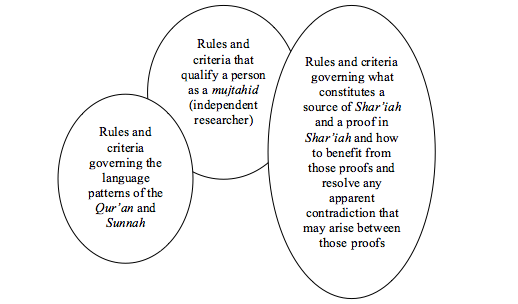Usul al-Fiqh series: Part I
Primer in conceptualization Usul al-Fiqh
The following series is intended to introduce Usul al-fiqh systematically. In this section, we will present several key concepts that summarize Usul al-fiqh about what is beneficial in this science, and why it is important.
Definition and description Usul al-Fiqh
Usul al-fiqh is a body of knowledge that clarifies various research methods and principles that help us understand Koran and Sunnah and it shows us how to benefit from them.
Secondly, Usul al-fiqh outlines for us that is evidence in Shar & # 39; iah, why it is considered evidence and how to understand how to work with evidence correctly, especially when they are unclear in meaning and when they seem to be contradictory.
Third, he teaches us the proper means by which we can make judgments from the Qur'an and Sunnah – ordinances that determine a person’s actions, determining whether the act is:
- Forbidden (haram)
- Unloved (makrooh)
- Mandatory (wajib)
- Featured (mandub, mustahabb)
- Soluble (mubah)
Fourth, Usul al-fiqh outlines for us the rules that govern the patterned way of the Arabic language in the Qur'an and Sunnah so that we know what is being communicated to us, and we understand how to interpret them correctly on the basis of linguistic or textual evidence.
The process of understanding key sources and extracting leadership and management from them in a systematic manner is called ijtihad (independent study).
Benefits Usul al-Fiqh
Usul al-fiqh gives us the basics of research for understanding the language Koran and Sunnah and how to use the various types of evidence so that they serve as a guide for our Islamic practices and beliefs. Understanding Usul al-fiqh as a research methodology, we also understand how scientists build their positions using evidence found in Arabic or Koran and Sunnah,
Across Usul Al-Fiqh, we also learn that positions that are not built by reference to the principles and tools found in the sciences are positions that are not considered acceptable for later ones, since they are built and concluded without proper study of an acceptable research methodology and, therefore, are not mandatory authority. Authoritative positions in Islam are only completed and built using proper research methods. These methods guide research, setting out what constitutes the source of the research, and what principles should be used to understand this source. In addition, these methods emphasize how, when and why the rule is derived from the source being studied and what qualifications it must have as a researcher in order to qualify for such a commitment.
goal Usul al-Fiqh
Usul al-fiqh helps us develop appropriate research skills and mental frameworks that allow us to systematically understand (research method) necessary for proper understanding Koran and Sunnah He provides us with the necessary tools for ijtihad and develop not only legal minds and legal potential, but the mind is able to correctly interpret the source texts of Islam and apply them to life. Short of purpose Usul al-fiqh is an ijtihad (independent reasoning, research).
framing Usul al-Fiqh: Three main problems of science
There are three main areas to science. Usul al-fiqh:
These key areas of research are targeted research that clarifies the following topics.
The qualities of mojahtakhid:
Understanding these criteria, we understand who is qualified and qualified for scholarships and who is not. A person without experience in ijtihad known in Usul al-fiqh literature like muqalid. muqalid is a person who does not have the right to participate in an independent investigation, because he lacks the qualifications, which means that he has not mastered the principles of the research methodology. Consequently, this category of persons is obliged to follow the research of those who have the right to research, but he is invited to make efforts to assimilate and understand, over time and gradually, how scientists come to conclusions and reasoning governing their positions.
Linguistic evidence:
Arabic is governed by customs and patterns. Understanding this, we can conclude that it is indicated in a particular scheme. For simplicity, we speak only about those instructions that tell us whether the decree is a command to do something or do something, or if the template recommends only doing or not doing any action or simply leaving the question to a decision. In Arabic there is other patterns that relate to understanding if the question is general or specific, but it will suffice for us to mention that the language is determined by patterns that need to be understood in order to complete their meaning.
Rules for working with evidence:
AT Usul al-fiqh we will also learn how to weigh, evaluate, and distinguish between evidence, defining its strength and relationship with other evidence and principles. When there is an obvious conflict between this evidence, the scientist must understand how to reconcile this evidence. When determining that the evidence cannot be reconciled after a thorough and lengthy investigation, it can be determined that one of the two proofs must be overruled. The rules governing the process of ranking, reconciliation and cancellation when dealing with evidence are a serious problem. Usul al-fiqh and this is an area in which only the most experienced scientists can maneuver and manifest themselves.
Key questions:
- What is the purpose Usul al-fiqh?
- Why Usul al-fiqh important?
- What are the three main areas of study in Usul al-fiqh?
- Why is it correct to have a methodology in understanding the Koran and Sunnah?
- Who is a person who can independently explore the Quran and the Sunnah?
- Can a person explore the Quran and the Sunnu without understanding the criteria that define the research and the researcher?

